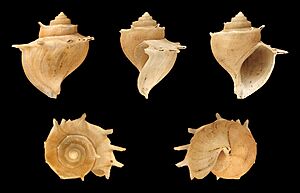Tiphobia horei facts for kids
Quick facts for kids Tiphobia horei |
|
|---|---|
 |
|
| Five views of a shell of Tiphobia horei | |
| Conservation status | |
| Scientific classification | |
| Kingdom: | |
| Phylum: | |
| Class: | |
| (unranked): |
clade Caenogastropoda
clade Sorbeoconcha |
| Superfamily: |
Cerithioidea
|
| Family: |
Paludomidae
|
| Subfamily: |
Hauttecoeuriinae
|
| Tribe: |
Tiphobiini
|
| Genus: |
Tiphobia
E. A. Smith, 1880
|
| Species: |
T. horei
|
| Binomial name | |
| Tiphobia horei E. A. Smith, 1880
|
|
| Synonyms | |
|
Melania Horei E. A. Smith, 1880 |
|
Tiphobia horei is a type of freshwater snail. It lives in water and belongs to a group of animals called mollusks. This snail has a special lid on its foot called an operculum. It helps the snail close its shell for protection.
Tiphobia horei is the only species in its group, called the genus Tiphobia. This genus is also the main example for a larger group called the Tiphobiini tribe. The snail's name, horei, honors Reverend Edward Coode Hore from the UK. He lived from 1848 to 1912.
Contents
Where It Lives
Tiphobia horei is only found in one place: Lake Tanganyika. This large lake is located in Africa. You can find this snail in several countries around the lake. These include Burundi, the Democratic Republic of the Congo, Tanzania, and Zambia. The very first Tiphobia horei snail ever found was near Ujiji in Lake Tanganyika. This place is called its "type locality."
These snails usually live on muddy lake bottoms. They are often found close to where rivers flow into the lake. They can live from the shoreline down to about 150 meters (492 feet) deep. They are more common in the deeper parts of the lake.
What It Looks Like
Tiphobia horei has a large shell. Its shell has spines, which makes it easy to spot. The shell is usually about 26 millimeters (1 inch) wide. It is typically about 36 millimeters (1.4 inches) tall. Some shells can grow even taller, up to about 52 millimeters (2 inches).
Reproduction and Life Cycle
This snail gives birth to live young. This means the eggs hatch inside the mother's body. The mother snail can have almost 500 babies at one time. When the young snails are born, they are very tiny. Each baby snail is only about 1.5 millimeters (0.06 inches) long. Tiphobia horei eats detritus. Detritus is made up of small pieces of dead plants and animals.
How It Is Protected
In 1996, this snail was listed as an endangered species. This meant it was at high risk of disappearing. But in 2006, its status changed to Least Concern. This is good news! Scientists found that the snail is actually widespread in Lake Tanganyika. It is also common in many areas.
There are some minor threats to Tiphobia horei. These include sedimentation (mud building up), dredging (removing mud from the lake bottom), and people collecting shells. However, these activities are not considered a big danger to the species as a whole.
Images for kids




